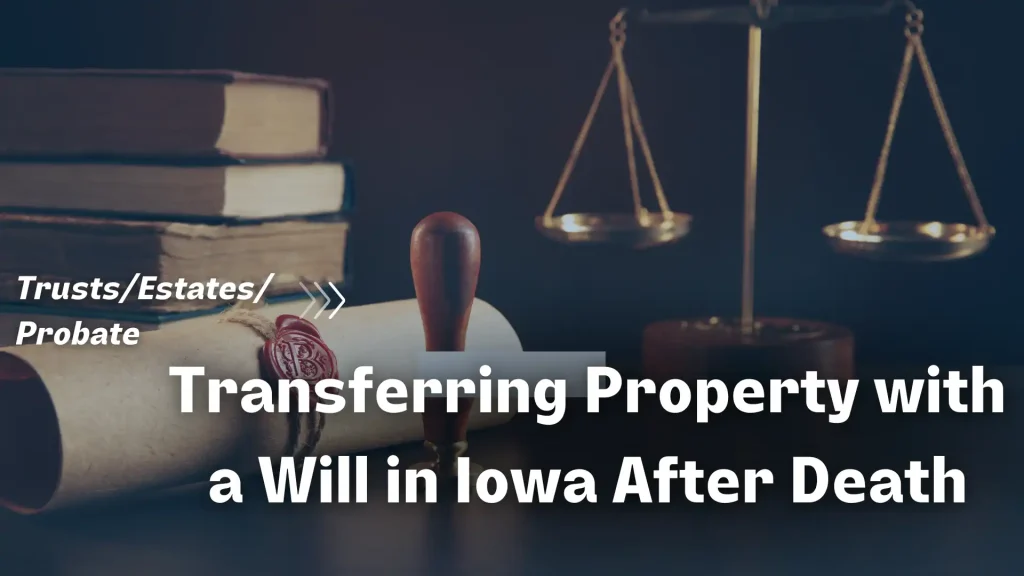
After the passing of a loved one, figuring out what should happen to their property may seem daunting, especially if they have a large amount of assets. If the loved one who passed was one of your parents, how do you transfer their property to the proper beneficiaries, including yourself and your siblings? How to transfer property after the death of a parent with a will in Iowa?
In Iowa, the will of the deceased is the primary document determining who receives what after a family member’s death. Here’s an overview of how to transfer property after the death of a parent with a will.
What Is a Will?
A will is a legal document laying out how the court and the family should divide a person’s property after death. The testator (the creator of the will) and two witnesses must sign the will for it to be valid under Iowa law. It will simplify the inheritance process by outlining who receives what. However, not everyone has a valid will when they pass. If this is the case, Iowa’s inheritance laws may come into play.
Iowa Inheritance Laws
Iowa’s inheritance laws provide general outlines for who receives how much of the deceased person’s estate if there is no will or the will doesn’t mention specific property or assets. The inheritance laws state that:
- If the deceased has surviving children or other descendants but no spouse, the children or other descendants receive the entire estate if there are no surviving children.
- If the deceased has a surviving spouse and no children or surviving children who are the descendants of the deceased and the spouse, the spouse receives the entire estate.
- If the deceased has a surviving spouse and surviving children who are not descendants of the spouse, the spouse receives 50 percent of the deceased’s real and personal property.
- If the deceased has surviving parents but no spouse or descendants, the parents receive the entire estate.
- The siblings receive the entire estate if the deceased has surviving siblings but no surviving spouse, descendants, or parents.
How Does the Iowa Probate Process Work?
Estates without a will or living trust must go through probate if they exceed Iowa’s small estate threshold. The probate process includes:
- An attorney files an existing will in the district court
- An attorney files a petition for probate to determine the estate’s executor (if the will doesn’t name an executor, the court will appoint one)
- The court publishes a notice of the petition for probate for heirs and creditors
- The executor receives legal authority to act on behalf of the estate
- The executor files all assets of the estate with the court
- The executor files to close probate after settling the estate’s debts
- The executor divides the remaining assets and property among the beneficiaries
Special Considerations
There are a few special circumstances that may alter the probate process or the terms of the will, including:
- If the estate’s total value is less than $200,000, the estate may go through small estate administration rather than the full probate process. Small estate administration is generally less costly and time-consuming.
- The elective share of the surviving spouse grants the surviving spouse at least one-third of the deceased’s real and personal property, regardless of what the will states.
- Homestead rights protect the surviving spouse and minor children from losing their family home to repay the estate’s debts.
Avoiding Probate in Iowa

There are a few ways to avoid having certain assets go through probate in Iowa. Some strategies for bypassing probate include:
- Living Trusts – A person can transfer assets into a living trust during their lifetime. Upon their death, the assets within the trust pass directly to their beneficiaries.
- Joint Ownership – If a person jointly owns an asset with someone else, the joint owner receives full ownership upon the other’s death.
- Payable-on-Death – Payable-on-death accounts pass the funds directly to a beneficiary upon the account if the owner dies.
- Transfer-on-Death – Transfer-on-death deeds pass real estate directly to a beneficiary upon the deed owner’s death.
- Account Beneficiaries – Retirement and other financial accounts can have beneficiaries who receive assets or account ownership after the original account owner’s death.
- Gifts – Gifts given during a person’s lifetime remove assets from an estate and do not go through probate. These gifts could also reduce the estate’s size to below the small estate administration threshold.
Contact an Iowa Wills Attorney
If your parent passed away and you need help settling their estate, contact Arenson Law Group, PC today by calling (319) 363-8199. Our team of experienced Iowa estate planning attorneys will explain your legal options and help you comply with the state’s inheritance laws.
Related Posts:
How to Get an Emergency Custody Order Tips